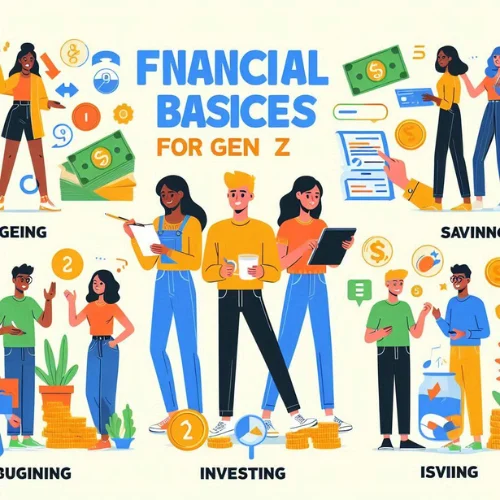Gen Z: Know Your Money – A Guide to Financial Empowerment

|
Getting your Trinity Audio player ready...
|
Managing money wisely is one of the most important life skills Gen Z needs to master. Whether you just got your first job, are paying off student loans, or trying to save for your future, understanding your finances early can set you up for lifelong success. This guide will help Gen Z navigate budgeting, saving, investing, and building healthy financial habits in a fast-changing world.
Why Gen Z Needs to Understand Money

Gen Z (born between 1997 and 2012) is entering adulthood during a time of economic uncertainty, digital innovation, and shifting job markets. Learning how to manage money is no longer optional. It’s a necessity.
Key Financial Challenges Gen Z Faces:

- Rising cost of education and student debt
- Limited job security and gig economy roles
- High living expenses in urban areas
- Temptation of social media-influenced spending
- Lack of formal financial education in schools
Understanding money means knowing how to save, spend, and grow it—on your terms.
Step-by-Step Financial Basics for Gen Z

1. Track Your Income and Expenses
The first step to knowing your money is tracking what comes in and what goes out. Use a budgeting app or spreadsheet to list:
- Your sources of income (job, freelance, allowance)
- All regular expenses (rent, food, subscriptions)
- Irregular or surprise spending (gifts, emergencies)
2. Set Up a Simple Budget
Use the 50/30/20 budgeting method:
- 50% for needs (rent, food, bills)
- 30% for wants (entertainment, eating out)
- 20% for savings and debt repayment
This method helps you create balance and plan ahead.
3. Start an Emergency Fund
An emergency fund is money set aside for unexpected expenses. Aim to save at least $500 to $1,000 to start. Keep it in a separate savings account so you’re not tempted to spend it.
4. Understand Credit and Debt
Credit is useful when used responsibly. Know the difference between good and bad debt:
| Type of Debt | Good or Bad | Example |
|---|---|---|
| Student Loans | Good | Investing in education |
| Credit Card Debt | Bad | Unpaid shopping balance |
| Car Loan | Mixed | Depends on interest rate |
| Payday Loans | Bad | Extremely high interest |
Pay your credit card in full each month to avoid high-interest charges.
5. Save and Invest Early
The earlier you start saving, the more your money grows. Thanks to compound interest, investing even small amounts in your early 20s can grow significantly over time.
Options for beginners:
- High-yield savings account
- Roth IRA (Individual Retirement Account)
- Micro-investing apps
Start with what you can, even if it’s $10 a week.
6. Learn to Differentiate Needs vs Wants
Ask yourself before buying:
- Do I need this to live or work?
- Can I afford it without using a credit card?
- Will this make me happy a week from now?
Being mindful of your spending builds long-term financial discipline.
Pros and Cons of Gen Z’s Financial Environment
| Pros | Cons |
| Early access to digital banking tools | Exposure to unrealistic spending norms |
| More financial resources online | High student loan burden |
| Potential to build wealth earlier | Unstable job market |
| Increased awareness of financial topics | Lack of real-life financial experience |
With the right tools and mindset, Gen Z can overcome these challenges and thrive.
Digital Tools to Help Gen Z Know Their Money
Budgeting Apps:
- Mint
- YNAB (You Need A Budget)
- EveryDollar
Savings Apps:
- Qapital
- Chime
- Digit
Investing Apps:
- Acorns
- Robinhood
- Fidelity Youth Account
Compare features based on fees, ease of use, and learning support.
| App Name | Best For | Cost | Learning Features |
| Mint | Beginners | Free | Basic tips and alerts |
| Acorns | Micro-investing | Small fee | Automated investing |
| YNAB | Budget planners | Paid | In-depth tutorials |
Choose tools that align with your financial goals and habits.
Smart Financial Habits to Build Now
- Pay yourself first: Save before you spend
- Avoid lifestyle creep: Don’t spend more just because you earn more
- Use credit wisely: Keep usage below 30% of your limit
- Read and learn: Follow financial books or podcasts
- Check your accounts regularly: Stay aware of your balances
Consistency in small habits leads to big financial wins.
FAQ: Gen Z and Money
Q: What’s the best age to start investing?
A: As soon as you have income. Even small amounts invested early can grow thanks to compounding.
Q: How do I avoid credit card debt?
A: Pay your full balance each month and don’t spend more than you can afford.
Q: Do I need a financial advisor?
A: Not necessarily. Many online tools can guide you, but advisors can help with bigger financial decisions.
Q: How can I save money on a low income?
A: Track spending, cut unnecessary costs, and automate small savings each month.
Q: Is student debt worth it?
A: It can be if your degree leads to strong job prospects. Always compare costs and future earning potential.
Conclusion: Gen Z, It’s Time to Know Your Money
Knowing your money is not just about saving—it’s about gaining freedom. Financial literacy empowers Gen Z to make smarter choices, avoid common traps, and plan for the future. Whether you’re starting small or already earning, the best time to take control of your money is now.
Start today: create a budget, open a savings account, and learn about investing. Your future self will thank you.






